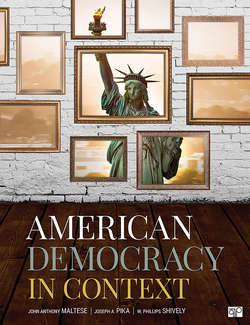Читать книгу American Democracy in Context - Joseph A. Pika - Страница 14
На сайте Литреса книга снята с продажи.
Perspective: What Difference Does Democracy Make?
ОглавлениеIn the United States, trains covered with bright, fanciful graffiti are often seen rolling down the tracks. The graffiti constitutes vandalism, but while vandalizing property by painting graffiti is illegal in most states and cities, authorities do not usually enforce the laws against it very strictly. In fact, some Americans admire graffiti as an elevated art form, romanticizing graffiti artists as individuals who thumb their noses at the government.
It is different in Singapore. In 1994, 18-year-old American student Michael Fay ran afoul of Singapore’s stringent laws protecting order and cleanliness. Singaporean police arrested Fay for stealing highway signs and vandalizing a car by scratching its paint. His court sentence: four months in jail, a fine of over $2,000, and four strokes with a cane. The caning—a common punishment in Singapore—was administered with a six-foot long, one-inch-thick cane that can cause serious injury. Other acts that are not necessarily considered crimes in the United States but can draw similarly serious punishments in Singapore include spitting in public, selling chewing gum, or failing to flush the toilet in a public restroom.
Singapore was a British colony until it became independent in 1965. Today, it is a prosperous financial center and technology exporter. Average incomes in Singapore are somewhat higher than those in the United States; crime rates are low; and the country is very clean, partly because of its stringent punishments for graffiti and similar offenses that other countries would consider minor. Its government is one of the least corrupt in the world.
Although efficient and prosperous, Singapore is not a democracy. Its government regulates citizens’ behavior tightly. Elections are held regularly, but the People’s Action Party, which has governed without interruption since it led the country to independence more than 45 years ago, does not allow a significant opposition party to develop or function. It requires all political organizations to register with the government, and organizers of any public gathering of more than five people must obtain a special permit. This allows the government to regulate opposition activity. The Party also controls the media, all of which are owned by government-linked companies. Such control includes the banning of all political films and political television programs. In the 2015 election, the Party got 70 percent of the vote, winning 83 of the 89 seats in Singapore’s Parliament.
By contrast, the United States is less efficient and less tightly organized than Singapore, but it is a democracy. The media are not controlled by the government. The right of groups to organize and gather publicly is guaranteed in the First Amendment to the Constitution. And citizens who criticize public officials are protected against harassment. But the government in a democracy is not as free as a government like Singapore’s to put laws in place that lack broad support. Harsh anti-littering laws with physical punishment and jail time would not be tolerated by the public, even though such laws might produce a very clean country.
Actually, Singapore probably presents the most attractive instance of a non-democracy that we can come up with, since most non-democracies are not particularly well organized or well run. Singapore’s government avoids corrupt practices, it runs efficiently, and it has helped the country to prosper economically. But the lack of political freedom in Singapore has its costs. The people of Singapore are much more politically passive than Americans. While 17 percent of Americans discuss politics frequently, only 4 percent of Singaporeans do. Forty-one percent of them say that they never discuss politics at all. As far as political participation is concerned, 76 percent of Americans say that they would be willing to attend a lawful demonstration, whereas only 24 percent of Singaporeans would.1
